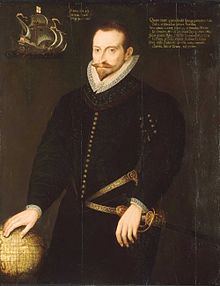James Lancaster
Sir James Lancaster (* around 1554 in Basingstoke , Hampshire , † June 6, 1618 in London ) was an English navigator , politician and pioneer of the English endeavors for the later British India .
Life
At the beginning of 1591, James Lancaster began his first East India voyage with three ships from Plymouth . This expedition was the very first British mission to these sea areas. The expedition reached Table Bay near what is now Cape Town on August 1st, lost a ship on September 12th, called at the port of Zanzibar in February 1592 , circumnavigated the southern tip of India ( Kanyakumari ) in May and reached the Malay Peninsula in June. Later, the Ceylon expedition explored where the crew could make the journey home. The journey home was disastrous and Lancaster was only able to bring 25 men back to England in 1594. In the same year Lancaster led a military expedition to Pernambuco in what is now Brazil, without much success .
In 1600 he was entrusted with the command of the first fleet of the English East India Company . The fleet began its mission in late April 1601. John Davis took part in the voyage as the helmsman . Lancaster was made official negotiator with the East Indian rulers by Queen Elizabeth I. The fleet reached the Cape of Good Hope on November 1st, the Nicobar Islands in April 1602 and later Aceh and other areas of Sumatra , Bantam and the Moluccas . In September 1603 the fleet returned home. The trip was hugely successful both diplomatically and economically. Lancaster was beaten for his services on this mission on October 2, 1603 to Knight Bachelor ("Sir") .
Until his death in 1618 Lancaster remained an influential leader of the company . Under his direction, other important expeditions were carried out both to India and in the search for the Northwest Passage .
William Baffin named Lancastersund in the northwest of Baffin Bay after him in 1616 . He is also the namesake for Lancaster Hill in Antarctica.
literature
- Lancaster, Sir James . In: Encyclopædia Britannica . 11th edition. tape 16 : L - Lord Advocate . London 1911, p. 147 (English, full text [ Wikisource ]).
Web links
- Sir James Lancaster. In: Encyclopædia Britannica . Accessed April 22, 2019 .
Individual evidence
- ^ William Arthur Shaw: The Knights of England. Volume 2. Sherratt and Hughes, London 1906, p. 129.
| personal data | |
|---|---|
| SURNAME | Lancaster, James |
| BRIEF DESCRIPTION | English navigator and politician |
| DATE OF BIRTH | around 1554 |
| PLACE OF BIRTH | Basingstoke |
| DATE OF DEATH | June 6, 1618 |
| Place of death | London |
